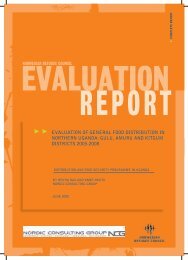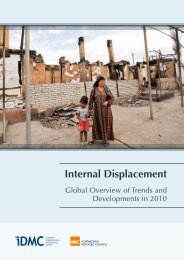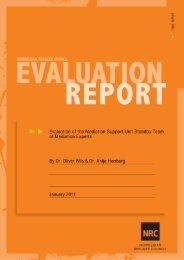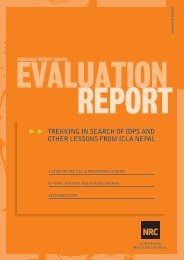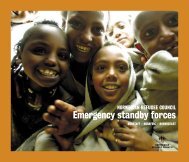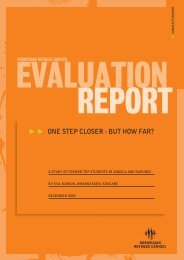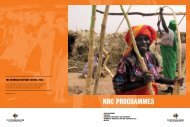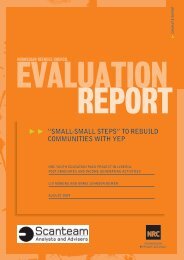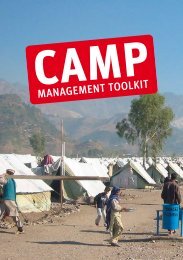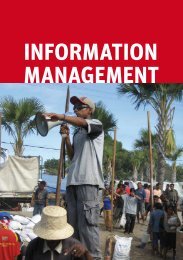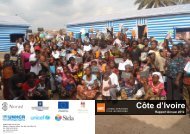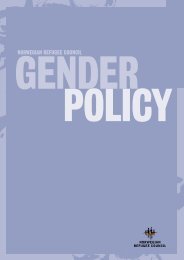Download full report - English version - ProAct Network
Download full report - English version - ProAct Network
Download full report - English version - ProAct Network
You also want an ePaper? Increase the reach of your titles
YUMPU automatically turns print PDFs into web optimized ePapers that Google loves.
Recommendations<br />
Wood is, and is likely to remain, the favoured preference of refugees for cooking.<br />
It is recommended that a practical management plan be drawn up immediately for<br />
the harvesting, transportation, storage and distribution of firewood to camps. This<br />
must be accompanied with a comprehensive assessment of real supply needs at the<br />
household level.<br />
While refugees at Gihinga claim not to like the briquettes, there is little evidence<br />
of illegal tree-cutting or charcoal making. Briquettes are a viable alternative<br />
energy source and appear to be accepted, where access to firewood is limited<br />
and/or controlled. The use of briquettes should therefore be continued at Gihinga<br />
camp, but people should be encouraged to use the briquettes only for the purpose<br />
for which they are intended.<br />
Before considering its application in the other camps, the briquette design should<br />
be improved, in consultation with beneficiaries at Gihinga. If 70 per cent of the<br />
current wood rations in all camps was replaced by briquettes, this would result in<br />
a 70 per cent reduction in firewood supply / consumption.<br />
Contrary to UNHCR s environmental guidelines, charcoal is produced in all of the<br />
camps. The production of charcoal within the camp boundaries should be actively<br />
discouraged by NRC, in co-operation with the camp police. Identifying the correct<br />
level of firewood delivered to camps is a starting point, as this will create a natural<br />
shortage of wood for transformation to charcoal. The introduction of such<br />
limitations should be linked with the participatory development of alternative<br />
income generating activities for existing charcoal producers (e.g. co-operative<br />
market gardens).<br />
The introduction of solar cookers should only be considered at an institutional<br />
level, and only where food preparation is not intended.<br />
The introduction of peat, kerosene or biogas is not viable in the refugee context in<br />
Burundi.<br />
2.4.7 Cooking Practices<br />
Focus group discussions and direct observation of cooking practices indicated<br />
awareness of the following fuel-efficient cooking practices:<br />
the use of pan lids;<br />
extinguishing fires immediately after cooking;<br />
pre-soaking dried foods;<br />
use of bicarbonate of soda to reduce cooking times for beans; and<br />
bulk cooking.<br />
It should, however, be pointed out that this refers to an awareness of fuel-efficient<br />
cooking practices only and should not be seen to translate into the application of such<br />
practices. While the use of pan lids was commonly noticed in the camps, there was<br />
22




